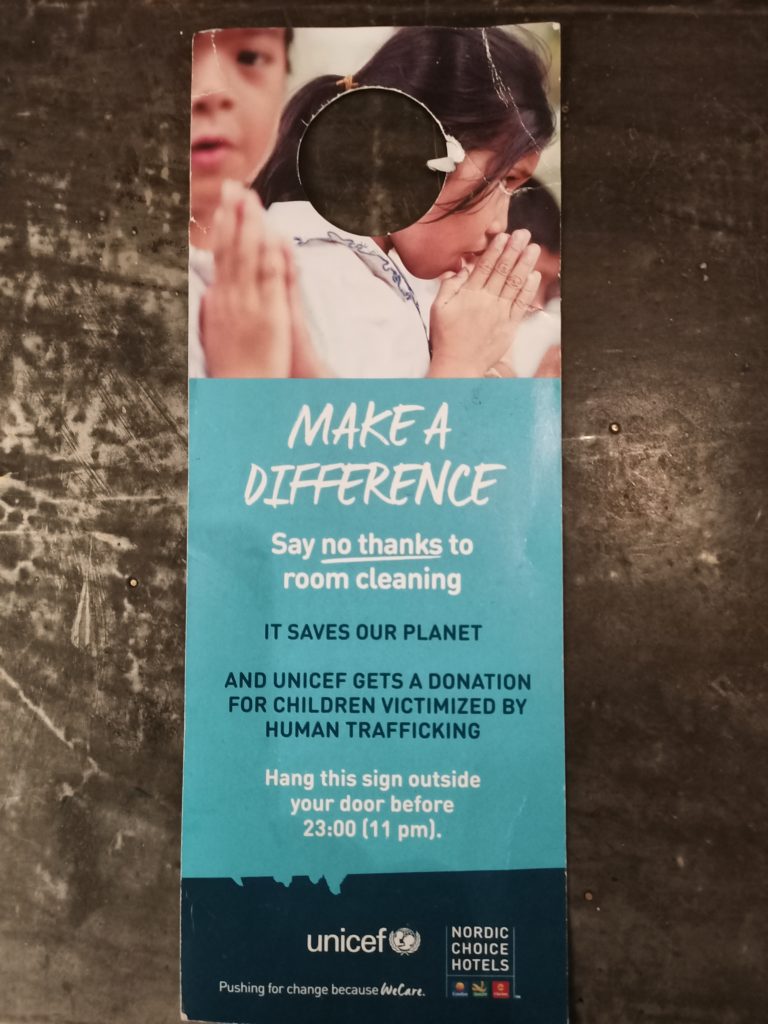Individual actions that receive praise and social approbation are often those were the individual doesn’t act in ways consistent with their narrow self-interest but sacrifices self-interest for the public good.
A jargon economists use for one type of that public spirited action is “internalizing externalities.” An “externality” is something I do that imposes costs or creates benefits for others but which isn’t reflected in the costs and benefits I personally face. So I could litter and just throw trash on the ground rather than find a waste bin and that would be the privately optimally action given costs and benefits if I didn’t factor in the well-being of others. But my litter reduces enjoyment for others and I should expect social disapproval (“hey, jerk, don’t litter”) if I don’t internalize the externality.
Lots of actions, like not using single use plastic bags or using paper straws or not eating beef or driving a Prius are reflections that the full cost of our consumption decisions on the environment are not factored into the prices we face. When the price of carbon is too low, people want to internalize those externalities and want those actions to be acknowledged with positive social approval.
But for people living in rich countries most people are not considering at all their behavior towards what is the largest price distortion they face, by far. All rich OECD countries impose massive barriers to the mobility of labor. This means the domestic price of labor that rich country citizens face vastly overstates the global cost of low to medium skill labor. Estimates I have done with Michael Clemens and Claudio Montenegro on the Place Premium suggests that in the USA the domestic cost of low skill labor is roughly four to five times higher than its true availability cost to the USA.
That means that if you live in an OECD country, while your current consumption might have too many plastic bags or hamburgers and laundered towels relative to their true cost that factors in environmental damage (externalities not reflected in prices), that is trivially small compared to the fact that your consumption, by reflecting prices distorted by policy choices and not true scarcity values, has dramatically too little unskilled labor.
Here is an example of the odd economics this creates. Here is a automated check out machine at a convenience store in the UK charging me for use of plastic bags. Every economist; left, right, center, agrees that prices should reflect their total, all-in, scarcity value (including externalities, such as environmental damage, that might be under-priced by a free market). But I am being charged this fee for a plastic bag by a machine that has been invented and is being used because a distortion in markets that is larger than the under pricing of plastic bags, by orders of magnitude. Unskilled labor in the UK doesn’t reflect the true global scarcity of labor, it reflects massive policy based distortions to the mobility of labor in the UK that create local prices and availability of labor that do not reflect true economic costs and induce people to use far too little labor and use cheap capital and technology instead.

Using too little labor is bad because far and away the largest proximate cause of poverty is low wages for low skilled labor. Since raw labor is far and away the most important asset of the world’s poor anything that drives down the demand for labor creates a negative externality by raising poverty. So just as using too many plastic bags harms the environment more than its benefits, using too little labor relative to its true scarcity and productivity increases poverty more than its benefits in economizing on labor.
A second example, which gets all of the issues of private and public costs and incentives so badly muddled it is tragi-comic. I went to Norway awhile back and the hotel I stayed in had this door hanger. Given the very high cost of labor in Norway the hotel has powerful incentives to induce its customers to not have their rooms made up as this is likely the largest single element of their marginal cost of providing a room. So they are, in their private interest given costs, trying to convince their customers to voluntarily forgo having their rooms cleaned as it increases their profits. I understand that.

The hotel is trying to convince customers to increase hotel profits is by convincing the customer they are more virtuous if they don’t have their room cleaned because (a) “it saves our planet” and (b) they will donate to victims of human trafficking.
First, the real virtuous thing to do if you want your consumption to reflect externalities is to insist that the hotel use the unskilled labor to clean your room every day (maybe twice a day) because labor is not globally scarce and the hotel should do the virtuous thing and use more unskilled labor reflecting is global scarcity not distorted domestic price.
Second, while not having one’s towels laundered might have some externalities if water and energy are under-priced I suspect these distortions are trivially small compared to actual costs, as water in Norway is priced and electricity in Norway is priced and these prices to the hotel may already reflect true environmental scarcity (particularly if electricity is from non-carbon using sources). So the idea this “saves the planet”–as opposed to “saves on the hotel’s expenses”–is a bit surreal.
Third, and this is truly where my head starts to spin, is the connection with human trafficking. So, Norway imposes an effective ban on low skill migration. This means that the wages for someone in Norway to clean your room is ten times higher than any income from employment a typical person could get in a poor African country. At these wage differentials, that actually reflect true productivity differentials, that is the hypothetical African worker’s marginal product in Norway really does justify the high wage, there is enormous pressure for people to get into Norway, legally or illegally. This desire to move to engage in perfectly ordinary labor–like cleaning rooms–is thwarted by Norway’s policy of restricting labor movement into Norway. This creates demands for “human trafficking” as people want to avoid the restrictions Norway has placed on their opportunities. So this hotel wants you to collaborate with them in driving down global demand for unskilled labor and in maintaining the distortions that make labor costly in Norway by not using unskilled labor to clean your room–and then make you feel good about that terrible choice by donating money to the victims of the illegal and extortionate and abusive industry those distortions create.
This could not be more economically wrong headed (except for about the hotel’s profits) and yet is accompanied by an encouragement to make the customer feel better about themselves.
Jesus once criticized people for “straining out the gnat but swallowing the camel.” People in the OECD today are busy using paper straws to strain out the environmental externality gnat while swallowing the the labor reducing effects of policy distorted labor costs, that are orders of magnitude larger, whole.
